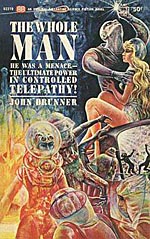
![]() couchtomoon
couchtomoon
4/30/2015
![]()
And then we have The Whole Man.
It's not Stand on Zanzibar.
The End.
Whatinole do you want? A synopsis? Fine.
Gerald Howson is born into disadvantaged circumstances with a disadvantaged physique, while a vague world crisis occupies the background. The short-statured, slumped boy with developmental delays struggles through life, until one day, his latent telepathic skills activate. When a crime career doesn't pan out, he joins a group of telepathists to guide the world and each other because, without proper guidance, telepathists can be the most dangerous threat to humanity.
It basically occurs in three acts, a la Karate Kid*: discovery of self, training of self, proving and rediscovering self. In ways, it doesn't feel like a complete story, just a playground of ideas to take effect later, possibly due to its status as a fix-up of three earlier novelettes. Brunner throws in some creative inventions: a visual musical organ, wet fireworks, a moldy dream dragon. Perhaps the coolest invention is catapathy, a dreamlike state resulting from a telepathic coma that could result in death for participants who become so entrenched in their fantasies that they forget to feed themselves. But it takes some treading through a rather mediocre story to get to the cool stuff.
Gerald is an interesting study as a vintage character with special needs, who "accepted discomfort as a fact of existence, because his distorted body was uncomfortable simply to live in" (ch. 1). A quiet child, his verbal delays suggest contemplation, rather than something neurological, "as though he had delayed speaking deliberately until he had thought the matter through" (ch. 3). However, being a vintage read, the lingo surrounding Gerald's developmental and biological special needs might bother the modern reader, although Brunner's treatment of Gerald is atypically sensitive in this sixties story. "Deformed" is used quite regularly, but never the "M-word," which is quite surprising for this era. But, to the consternation of modern SF readers looking for properly treated characters with special needs, Gerald's purpose is entirely about his struggle to overcome his limitations and poor sense of self, rather than just, you know, being a person who happens to _____. And, of course, the title itself spoils the way Gerald's personal self-esteem plays out. Just mid-century chicken soup.
This novel is better experienced as a study of the seeds of Zanzibar. Gerald's birth defects foreshadow Zanzibar's character strands dealing with issues of eugenics and state-mandated birth control laws. We see hints of the shiggies when Gerald's mother becomes a "housekeeper-mistress" (ch. 3) and we also meet a hemophiliac who calls himself a "bleeder" (ch. 9). A vague world crisis permeates the background, though where SoZ directly links its problems to overpopulation, hegemony, and depersonalization, the back story of The Whole Man remains unexplained– not because Brunner doesn't want to develop the background, but because his characters are poor, uneducated, incurious. They know there is a crisis because people talk about a crisis, but all they know is that they're hungry. When the crisis inexplicably lifts, they carry on, always lacking in comfort and security.
Akin to Sturgeon's More Than Human (1953), but forgettable, especially if you've already read Sturgeon's more poignant examination of humanity's next step, which, according to the mid-20th SF writers is telepathy, (although we know it's actually chicken fries). But the genre gurus say this is the transition point for Brunner, from producing disposable SF to creating landmark SF, where nihilistic world building and social criticism occupy the narrative.
Overall, The Whole Man feels like an exploration of the less-privileged parts of SoZ's First World, at least until Gerald breaks out of his poverty to become a famous telepathic mediator. It's well-done in the atmospheric sense, but stale and monotonous as a story, and structured without those exciting, Dos Passos-style syncopated glimpses.
It's just not Stand on Zanzibar.
*I never saw Karate Kid.
http://couchtomoon.wordpress.com